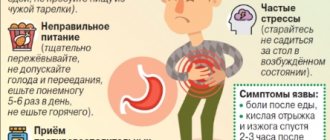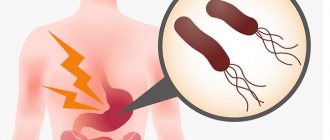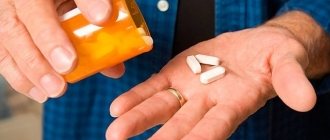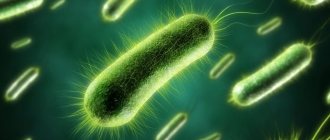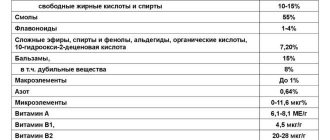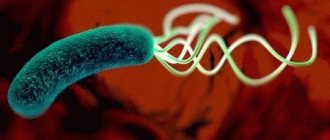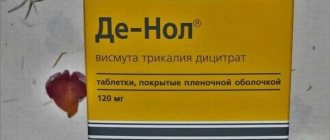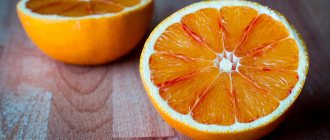Description of the bismuth preparation
De-Nol is an antiulcer gastroprotector.
It is produced in coated tablets. They contain 120 mg of the active substance bismuth oxide and povidone, hypromellose, starch, potassium polyacrylate, and other auxiliary components. After taking bismuthate, it is excreted from the gastrointestinal tract along with feces, and from the blood through the kidneys with urine. The use of De-Nol is indicated for exacerbation or development of:
- intestinal disorders due to diarrhea;
- dyspepsia that did not arise due to organic pathologies of the gastrointestinal tract;
- stomach ulcers, duodenal ulcers;
- duodenitis, gastritis;
- gastrointestinal pathologies caused by H. pylori (Helicobacter pylori).
The drug covers the mucous membrane with a foamy layer, which reduces the effect of gastric contents on its damaged surface, accelerates the regeneration of membrane cells, and prevents an increase in ulcers or erosions. Clinicians discovered that De-Nol acts on Helicobacter, so doctors began to include it in H. pylori eradication regimens.
De-nol in the treatment of gastritis caused by the bacterium Helicobacter pylori
De-nol is available without a prescription, so there is a temptation to buy it bypassing the doctor's office and self-medicate.
Many people do this, but instead of the desired positive result, they get side effects in the form of darkening of the gums and tongue, and black stool.
To understand why the product does not work, it is worth understanding its properties.
Does it make sense to take medicine at the first sensation of pain, without knowing the exact diagnosis, or should there be serious indications for its prescription?
In order for a drug to perform its function, its use must correspond to its pharmacological action.
De-nol does not have an antispasmodic effect and is not an enterosorbent, so there is no need to take it for pain caused by acute gastritis or poisoning.
The action of the medicine is aimed at protecting stomach tissues that have damage in the form of ulcers and erosions.
To prevent hydrochloric acid from reaching the damaged areas, they need to be protected from its aggressive effects, and also the activity of acidic gastric enzymes must be reduced.
This task is performed by bismuth, the active substance of De-nol. By binding to the proteins of dead tissue, it forms a paste-like mass that seals the ulcers, thereby protecting them from acids.
Results of studies on the action of the gastroprotector
The effectiveness of De-Nol is higher in people with a gastric juice pH equal to or less than “4”, regardless of the presence of Helicobacter pylori. Due to the precipitate of oxychloride with bismuth, the substance forms a polymer-glycoprotein foamy shell that covers the surface of the mucosa. On the ulcerations themselves, it lasts for 2-3 hours, then is finally removed from the stomach.
For gastrointestinal diseases caused or not associated with Helicobacter, De-Nol relieves inflammation of the mucous membrane and accelerates the healing of ulcers of any etiology. This effect occurs due to the film coating, through which gastric enzymes, hydrochloric acid, and food do not irritate the damaged tissue.
During the experiments, other effects of the drug De-Nol were also revealed:
- activation of mucin production processes (intragastric mucus);
- increased bicarbonate synthesis, which reduces the effect of acid and pepsins;
- improving the properties of mucus.
During and after therapy, clinicians specifically examined the stomach to determine whether De-Nol kills Helicobacter. Based on the test results, the coagulation property of bismuth was discovered: the substance coagulates the bacterial protein, so the pathogenic cell dies. The formed foamy membrane also prevents the attachment of microbes to the mucous membrane, which reduces the rate of reproduction, spread and prevents the appearance of new colonizations of the body of the stomach.
If you take De-Nol against Helicobacter as a monotherapy, the destruction of H. pylori is confirmed only in 30% of clinical cases. Increasing dosages or prolonging the course of therapy for more than two months in patients provokes renal dysfunction or encephalopathy.
The bactericidal effect of De-Nol against Helicobacter infection increases to 90% with combination therapy. The medicine is best combined with penicillin antibiotics and broad-spectrum antimicrobial agents.
Prevention
Primary and secondary prevention of helicobacteriosis have minor differences. The general rules for the two programs are identical. Only the recommendations for therapeutic measures differ. In the second case, the doctor’s recommendations must be strictly followed. If the course of medication is completed prematurely, there is a risk of not only relapse, but also life-threatening complications from the digestive tract.
General preventive measures:
- compliance with the rules of balanced and proper nutrition;
- eating only clean food and water;
- timely treatment of diseases of the digestive tract;
- implementation of measures to strengthen the immune system;
- compliance with personal hygiene standards;
- regular examinations by a gastroenterologist for abnormalities in the digestive system;
- mandatory diagnostic procedures for suspected Helicobacter pylori infection.
Video on the topic: Antibiotics against Helicobacter pylori.
Therapy aimed at expelling Helicobacter rulori from the stomach of a person infected with it is not the easiest task that a doctor sets for himself.
This is due to the fact that pathogenic microorganisms are extremely reluctant to leave their favorite places of existence - the epithelial cells of the inner lining of the stomach or the submucosa, and drug-resistant strains are formed.
Therefore, the effect on the bacterium must be complex: medication, physiotherapy, nutrition, phytotherapeutic. The main point of application is drug therapy.
Special instructions for taking a gastroprotector
De-Nol is contraindicated for use by children aged 0-3 years, pregnant women, those with hypersensitivity to the active substance, the presence of insufficiency and other severe kidney diseases. Lactating women during treatment for Helicobacter pylori and for 2 months after therapy need to feed the child artificially. Bismuthate is not compatible with ethanol, so you should not drink alcohol while using them.
For Helicobacter, it is better to take De-Nol to destroy H. pylori together with Metronidazole and Amoxicillin. In case of intolerance, tetracycline is used, but the gastroprotector substance reduces the absorption of this antibiotic. To prevent dysbiosis in the gastrointestinal tract, you need to additionally take pro- and prebiotics.
Some products or medications affect the action of De-Nol and reduce the destruction of Helicobacter infection. Therefore, you should not take the following for half an hour before and after taking the pill:
- milk;
- milk soups, porridges, cocktails and other dishes with its addition;
- fresh fruits or their juices;
- anacidic drugs;
- solid food.
You can continuously treat Helicobacter with De-Nol for no longer than eight weeks, and after you finish taking it, you cannot use other products containing bismuth for two months. This is necessary so that the body is cleared of bismutate tripotassium dicitrate, and subsequently there is no overdose.
How to take and how much to drink De-nol
The drug is approved for use by adults and children over 14 years of age. If there are no other doctor’s recommendations, there are 2 options for its use:
- 1 tablet 3 – 4 times a day 30 minutes before meals. The last dose can be taken at night, regardless of meals.
- 2 tablets 2 times a day 30 minutes before meals.
Take the drug with clean water; immediately after it you should not drink milk or fermented milk drinks, as they reduce the effectiveness of De-nol.
You can eat and drink liquids after half an hour to an hour. The course of use of the medicine is 4 – 8 weeks. The doctor decides how many days the antibiotic therapy lasts.
Its duration depends on the severity of the condition, the number of bacteria in the body, and concomitant diseases.
Bismuth preparations have some side effects that do not appear often, many go away immediately after discontinuation. The most harmless are black feces, darkening of the tongue and gums.
More serious reactions:
- nausea and vomiting, defecation disorders;
- skin rash, urticaria, itching;
- symptoms of encephalopathy with frequent use of large doses;
- absent-minded attention, memory impairment (rare);
- kidney disorders if the permissible dosage is exceeded by 10 times or more.
The use of De-nol is contraindicated during pregnancy, lactation, in children under 14 years of age, and in patients with severe kidney pathologies.
To enhance the therapeutic effect, the use of De-nol should be combined with a strict diet. Heavy foods that irritate the gastric mucosa are excluded from the diet.
The ban includes pork, geese and duck meat, high-fat dairy products, fried foods, sausage, smoked products, confectionery, baked goods, fresh bread, chocolate, cocoa, coffee, fast food.
Alcohol and smoking not only tobacco, but also electronic cigarettes and hookahs are strictly contraindicated, since the substances in smoking mixtures have the same negative effect on the stomach as nicotine.
In addition to diet, for the stable condition of a patient with gastritis, you need to monitor your psycho-emotional mood.
Frequent stress and depression are one of the factors that provoke the frequency and intensity of exacerbations.
The therapy is complemented by simple physical activity, walks in the fresh air, and positive emotions.
Gastritis caused by Helicobacter pylori can be cured, so at the first symptoms of the disease you should consult a doctor; only a gastroenterologist will prescribe antibiotics that are active against a unique bacterium, as well as additional drugs that speed up recovery.
Monotherapy with bismuth preparation
De-Nol for Helicobacter infection is taken orally before consuming food. The tablet is washed down with 50 ml of still, non-mineralized water. Eating is allowed half an hour after taking the drug. You cannot take other medications at the same time as the medicine - you need to maintain a 30-40 minute interval.
Helicobacter treatment regimen with De-Nol:
- In the therapy of children aged 4-7 years. The daily dosage of De-Nol is 8 mg of bismuth/1 kg of weight. The calculated norm is divided into 2 doses and given to the child ½ part before breakfast, and the remaining half before dinner;
- In the therapy of children aged 8-12 years. For Helicobacter infection, give a De-Nol tablet every 12 hours. The daily dose is 240 mg of bismuth;
- In the therapy of adolescents from 13 years of age, adults. For patients in this age category, two Helicobacter eradication schemes are used. First: De-Nol is taken 120 mg four times a day. Second: the drug is taken 240 mg (2 tablets) twice a day. According to both schemes, the daily norm is 480 mg of bismuth.
The gastroenterologist selects the duration of treatment for Helicobacter infection individually . De-Nol is used for no less than one and no longer than two months. Repeated therapy can be completed eight weeks after the end of the first course. But according to statistics, monotherapy does not cause the death of Helicobacter bacteria in 70% of clinical cases.
Combination therapy for Helicobacter pylori infection in adults
Treatment of Helicobacter pylori with De-Nol is combined with other antimicrobial drugs and antibiotics. Three- and four-drug treatment regimens are used. Complete eradication of H. pylori was detected in 90% of patients. In the remaining 10% of patients, a targeted analysis of the sensitivity of the microbe to drugs must be done.
Combined kits against Helicobacter pylori infection
Helicocin tablets are a two-component set of active ingredients: Amoxicillin 750 mg, Metronidazole 500 mg. The drug disrupts the intracellular metabolism of Helicobacter pylori and suppresses the microbe's resistance to antibacterial agents.
Combination therapy regimen:
- Helicocin - one oval and round tablet three times a day for 12 days;
- De-Nol - 120 mg tablet four times a day, the course of treatment lasts 45-60 days.
Instead of Helicocin, a combined set of Pilobact may be prescribed. One package contains a daily dose of tinidazole, clarithromycin, omeprazole. The drug is used twice a day for a week. The action against Helicobacter is supplemented with De-Nol at 480 mg/day.
Three-component treatment regimen and quadruple therapy
It is used in the treatment of elderly people with Helicobacter pylori infection.
The scheme includes:
- antibiotic Amoxicillin 500–1000 mg twice a day, drink for a week;
- gastroprotector De-Nol, 4 tablets/day, course of treatment – a month;
- proton pump inhibitor Lansoprazole 30 mg morning and evening for two weeks.
For adults of other ages, the composition of this 3-drug therapy is supplemented with a macrolide antibiotic. Klabax, Clarithrosin, and another drug containing the substance clarithromycin are used against Helicobacter pylori. The daily dose of clarithromycin is 1 g: 500 mg tablet in the morning and evening. The course of therapy is 10 days.
Cost and analogues of the drug Bismuth
De-Nol 120 mg is packaged in packages of 8, 32, 56 or 112 tablets. Depending on their quantity, the cost of the drug varies from 65 to 1010 rubles. The difference in price between the medicine from Russian and Dutch manufacturers is insignificant.
De-Nol against Helicobacter can be replaced with structural analogues. The drugs Bismuth tripotassium dicitrate, Vis-Nol, Escape, Vitridinol, GastroNorm, Ulkavis, Ventrisol, Novobismol, and other drugs with the code ATC A02BX05 receive good reviews.
